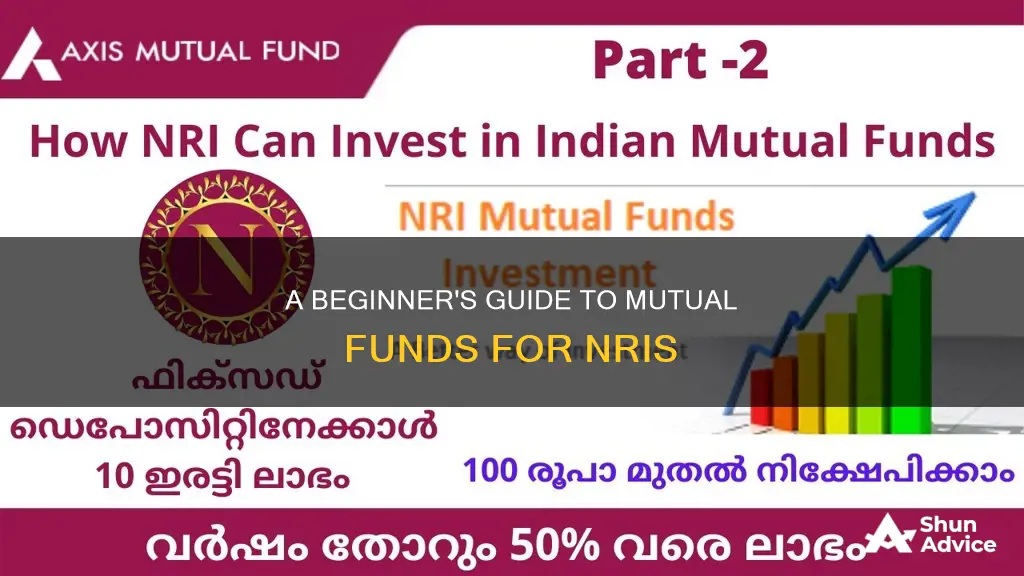
Non-resident Indians (NRIs) often seek investment opportunities in India to secure financial stability for themselves and their families. The Indian market offers a diverse range of investment options, including equities, mutual funds, fixed deposits, and debt funds, making it a promising avenue for wealth creation. Mutual funds, in particular, have become a sought-after option for NRIs due to their potential for high returns and flexibility. However, before investing in Indian mutual funds, NRIs must navigate regulatory requirements, tax implications, and the overall investment process, which can be complex and time-consuming. This includes understanding the different types of mutual funds, setting up the right bank accounts, ensuring regulatory compliance, and deciding between direct investment or using a Power of Attorney (PoA).
| Characteristics | Values |
|---|---|
| Who can invest in Indian mutual funds? | Non-Resident Indians (NRIs) |
| What is a Mutual Fund? | A common pool of funds managed by a professional Fund Manager. It’s a Trust that collects money from people who have a common investment objective and invests them accordingly. |
| Why should NRIs invest in Mutual Funds? | NRIs often seek investment opportunities in India to secure financial stability for themselves and their families. |
| How can NRIs invest in Mutual Funds? | Direct Investment or Power of Attorney (PoA) |
| What is Direct Investment? | The NRI submits their application and the required Know Your Customer (KYC) documents. This process may require in-person verification at the Indian embassy in their country of residence. |
| What is PoA? | NRIs can assign a PoA to a trusted individual in India to make investment decisions on their behalf. |
| What are the requirements for Direct Investment and PoA? |
|
| What are the tax considerations for NRIs investing in Mutual Funds? | The risk of double taxation is mitigated if India has a Double Taxation Avoidance Treaty (DTAA) with the NRI's country of residence. |
What You'll Learn
- NRO/NRE bank accounts are required to invest in Indian mutual funds
- Direct investment: submit an application and KYC documents
- Power of Attorney: assign a PoA to invest on your behalf
- Regulatory compliance: adhere to FEMA, submit FIRC, etc
- Tax considerations: avoid double taxation with a Double Taxation Avoidance Treaty

NRO/NRE bank accounts are required to invest in Indian mutual funds
Non-Resident Indians (NRIs) can invest in mutual funds in India, but they must follow the rules of the Foreign Exchange Management Act (FEMA). One of the key requirements for NRIs who want to invest in Indian mutual funds is to have an NRO (Non-Resident Ordinary) or NRE (Non-Resident External) bank account. These accounts serve different purposes and have distinct features that cater to the specific needs of NRIs.
An NRE Account is ideal for NRIs who want to transfer their foreign earnings to India. One significant advantage of this account is that the interest earned on funds deposited in an NRE account is tax-free in India. On the other hand, an NRO Account is suitable for NRIs who need to manage their income generated in India, such as rental income, dividends, or proceeds from property sales. This account allows for easy management of such earnings, and while the money kept in NRO accounts has to be in Indian rupees, it offers the advantage of repatriation, subject to applicable taxes.
To initiate the investment process, NRIs can utilise their NRE or NRO accounts to invest directly in mutual funds through regular banking channels. This approach gives them autonomy over their investment choices, enabling them to make informed decisions aligned with their financial objectives and market research. Alternatively, NRIs can opt for the Power of Attorney (PoA) route, where they authorise someone else to invest on their behalf. This option is particularly useful for those who may not have the time or inclination to manage their investments directly.
Regardless of the chosen investment method, NRIs must complete the Know Your Customer (KYC) process before investing in Indian mutual funds. The KYC documents typically include a recent photograph, certified copies of the PAN card, passport copy, residence proof of outside India, and a bank statement. Additionally, in-person verification may be required, which can be done by visiting the Indian Embassy in the NRI's country of residence.
A Guide to Investing in Funding Societies
You may want to see also

Direct investment: submit an application and KYC documents
To invest in Indian mutual funds, NRIs can choose to submit their application and KYC documents directly or assign a Power of Attorney (PoA) to someone in India to make investment decisions on their behalf.
To take the direct route, NRIs must submit their application along with the required Know Your Customer (KYC) documents. This process may require in-person verification, which can be done by visiting the Indian embassy in the country of residence with the relevant documentation.
The KYC documents typically include a recent photograph, certified copies of the PAN card, a passport copy, residence proof of outside India, and a bank statement. The bank may require in-person verification, which can be completed by visiting the Indian Embassy in the NRI's country of residence.
It is important to note that some mutual fund companies do not allow NRIs from the USA and Canada to invest in their schemes due to the more stringent compliance requirements under the Foreign Account Tax Compliance Act (FATCA). Therefore, NRIs from these countries should check the additional document requirements and conditions imposed by specific fund houses.
Power of Attorney (PoA)
The second method is to assign a Power of Attorney (PoA) to a trusted individual in India, who can then make investment decisions on the NRI's behalf. This approach requires the signatures of both the NRI and the PoA on all KYC documents.
Regulatory Compliance and Documentation
In addition to the KYC requirements, NRIs must also adhere to various regulatory requirements when investing in Indian mutual funds:
- FEMA Regulations: Comply with the Foreign Exchange Management Act (FEMA) and provide a declaration affirming adherence to Indian regulations.
- Foreign Inward Remittance Certificate (FIRC): For mutual fund investments, payments must be made via cheque or demand draft, accompanied by an FIRC to verify the source of funds.
- Redemption Process: Upon maturity or exit from a mutual fund investment, the proceeds are credited to the NRE/NRO account after tax deductions. For non-repatriable investments, proceeds are credited only to an NRO account.
Mutual Fund Investment: Getting Started and Where to Begin
You may want to see also

Power of Attorney: assign a PoA to invest on your behalf
If you are an NRI and do not want to invest or manage your mutual fund portfolio yourself, you can do so with the help of a Power of Attorney (PoA). A PoA is a person who has the legal authority to make decisions and act on your behalf.
In India, mutual fund companies allow PoA holders to invest on behalf of NRIs and make other investment decisions. Both your signature and that of the PoA are mandatory on the Know Your Customer (KYC) documents to be eligible to invest in mutual funds.
To complete the KYC process, you will need to submit the following documents:
- A copy of your passport (only relevant pages with name)
- Date of birth
- Photo
- Current residential proof, whether temporary or permanent
- Foreign residence proof
- In some cases, in-person verification may be required
Some fund houses may also require additional documents, such as a duly signed NRI declaration form for mutual funds. Therefore, it is advisable to confirm the requirements with your chosen
Once the KYC process is complete and your PoA is authorised, they can carry out transactions, debiting or crediting through normal banking channels.
Maharlika Investment Fund: A Sovereign Wealth Fund for the Philippines
You may want to see also

Regulatory compliance: adhere to FEMA, submit FIRC, etc
Regulatory Compliance and Documentation
To ensure a smooth investment process, NRIs must adhere to various regulatory requirements and submit specific documentation.
Know Your Customer (KYC) Compliance
Essential documents for KYC include a passport copy, PAN card, recent photograph, bank statement, and proof of address. The current residential proof, too, is a must, whether temporary or permanent resident in that country. Some fund houses may also insist on an in-person verification, which an NRI can comply with by visiting the Indian Embassy in their resident country.
Foreign Exchange Management Act (FEMA) Regulations
Investments must comply with the Foreign Exchange Management Act (FEMA), necessitating a declaration from NRIs to affirm adherence to Indian regulations. The definition of an NRI in FEMA decides where an NRI can invest.
Foreign Inward Remittance Certificate (FIRC)
For mutual fund investments, payments must be made via cheque or demand draft, accompanied by an FIRC to verify the source of funds. In the absence of a certificate, a letter from the bank is acceptable.
Redemption Process
Upon maturity or exit from a mutual fund investment, the proceeds are credited to the NRE/NRO account after tax deductions. For non-repatriable investments, proceeds are credited only to an NRO account.
Best Mutual Funds: Where to Invest Smartly
You may want to see also

Tax considerations: avoid double taxation with a Double Taxation Avoidance Treaty
Non-Resident Indians (NRIs) investing in mutual funds in India often fear they will have to pay double tax on their investments. However, this is not the case if India has signed a Double Taxation Avoidance Treaty (DTAA) with their country of residence.
A Double Taxation Avoidance Agreement (DTAA) is a treaty signed by two countries to make a country an attractive destination and to enable NRIs to get relief from paying taxes multiple times. DTAA does not mean NRIs can avoid taxes altogether, but it does mean they can avoid paying higher taxes in both countries. DTAA also reduces instances of tax evasion.
DTAA covers a range of income, including income from employment, business profits, dividends, interest, royalties, and capital gains, among others. These agreements specify guidelines as to which country holds the primary right to impose taxes on particular types of income. Typically, the country where the income is generated retains the primary right to levy taxes on it, while the country of residence may also impose taxes, but at a lower rate.
India has signed a DTAA with almost 100 major nations, including the United States of America. If India has signed a DTAA with an NRI's country of residence, they can prevent double taxation by utilizing the benefits of the DTAA.
- Deduction: Taxpayers can claim the taxes paid to foreign governments as a deduction in their country of residence.
- Exemption: Tax relief under this method can be claimed in either of the two countries.
- Tax credit: Tax relief under this method can be claimed in the country of residence.
NRIs can also avail of tax benefits under Section 80C of the Income Tax Act, 1961, by investing in mutual funds. The maximum deduction allowed under Section 80C is Rs. 1,50,000.
Longwood Fund: A Guide to Investing Wisely
You may want to see also
Frequently asked questions
Yes, Non-Resident Indians (NRIs) can invest in mutual funds in India as long as they adhere to the Foreign Exchange Management Act (FEMA).
The first step is to set up either a Non-Resident Ordinary (NRO) or a Non-Resident External (NRE) bank account with an Indian bank. This is because Asset Management Companies (AMCs) in India cannot accept foreign currency investments, so all investments by NRIs are made in Indian Rupees.
NRIs can either submit their application and the required Know Your Customer (KYC) documents themselves (direct investment), or they can assign a Power of Attorney (PoA) to a trusted individual in India to make investment decisions on their behalf.
Essential documents for KYC compliance include a passport copy, PAN card, recent photograph, bank statement, and proof of address. A current residential proof, whether temporary or permanent, is also required.
There is no risk of double taxation if India has signed the Double Taxation Avoidance Treaty (DTAA) with the NRI's country of residence.
(Optional) Q: What is a Mutual Fund?







